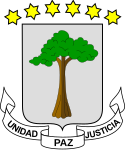| Parts of this article (those related to new election) need to be updated. Please help update this article to reflect recent events or newly available information. (March 2018) |
| Chamber of Deputies Cámara de los Diputados Chambre des députés Câmara dos Deputados | |
|---|---|
 | |
| Type | |
| Type | Lower house |
| History | |
| Founded | 1968 |
| Leadership | |
| President | Salomón Nguema Owono since 29 August 2024 |
| Structure | |
| Seats | 100 members |
 | |
| Political groups | Government (100) |
| Elections | |
| Voting system | Party-list proportional representation |
| Last election | 20 November 2022 |
| Meeting place | |
| Malabo | |
| Website | |
| presidencia-ge | |
| Politics of Equatorial Guinea |
|---|
 |
| Constitution |
| Government |
Parliament
|
Administrative divisions
|
Elections
|
Foreign relations
|
The Chamber of Deputies (Spanish: Cámara de los Diputados; French: Chambre des députés; Portuguese: Câmara dos Deputados) is the lower house of the Parliament of Equatorial Guinea.
Although vested with considerable powers under the country's constitution, the Chamber has been dominated by the Democratic Party of Equatorial Guinea since its establishment, and there is virtually no opposition to executive decisions. Indeed, there have never been more than eight opposition legislators in the body.
Electoral system
The 100 members of the Chamber are elected by closed-list proportional representation in multi-member constituencies. Members serve five-year terms.
Legislative history
The first legislative body was the unicameral General Assembly of Spanish Guinea (Spanish: Asamblea General) which was established in 1964, when Spanish Guinea was given autonomy. It was replaced by Republican Assembly (Spanish: Asamblea de la Republica) in October 1968, which had 36 deputies elected for five-year terms. Additionally there was Republican Council - Senate (Spanish: Consejo de la Republica). Mba Ada was the first president of the Senate. Senate ceased to exist in 1973 when most of the senators fled the country or were murdered. By 1974, four or every five deputies of the earlier Republican Assembly had been murdered.
The Republican Assembly was replaced by Popular National Assembly (Spanish: Asamblea Nacional Popular) in the Constitution of 1973. It had 60 deputies effectively selected by PUNT, the single party allowed to operate. The legislature was dissolved in 1979.
A unicameral House of Representatives of the People (Spanish: Cámara de los Representantes del Pueblo) started to function in 1983. All members needed to swore loyalty to Obiang Nguema.
In 2013, bicameralism was introduced with a Senate, and the House of Representatives of the People became the lower chamber as Chamber of Deputies.
Presidents of the Legislatures
| Name | Took office | Left office | Notes |
|---|---|---|---|
| Enrique Gori Molubela | 1964 | June 1965 | Of General Assembly |
| Federico Ngomo | June 1965 | 1968 | Of General Assembly |
| Pastor Torao Sikara | 16 October 1968 | 5 March 1969 | Of National Assembly |
| ? | 1969 | August 1979 | Of National Assembly |
| Legislature dissolved | August 1979 | 1983 | |
| Francisco Bodien Ngalo | 1983 | November 1993 | |
| Felipe Ondo Obiang | 21 November 1993 | November 1994 | |
| Marcelino Nguema Onguene | November 1994 | 1999 | |
| Salomón Nguema Owono | 1999 | 18 June 2008 | |
| Ángel Serafín Seriche Dougan | 18 June 2008 | 12 July 2013 | |
| Gaudencio Mohaba Mesu | 12 July 2013 | 29 August 2024 | |
| Salomón Nguema Owono | 29 August 2024 | Incumbent |
Last elections
| Party | Votes | % | Seats | +/– |
|---|---|---|---|---|
| Democratic Party of Equatorial Guinea | 100 | 0 | ||
| Total | 100 | 0 | ||
| Source: Government of Equatorial Guinea Archived 3 March 2016 at the Wayback Machine | ||||
See also
References
- "Equatorial Guinea: Electoral System". IPU. n.d. Archived from the original on 19 March 2003.
- ^ Liniger-Goumaz, Max (2000). Historical dictionary of Equatorial Guinea (3rd ed.). Lanham (Md) London: Scarecrow press. ISBN 0-8108-3394-8.
- "A Guinea Ecuatorial" (PDF). 1968. Archived (PDF) from the original on 15 June 2015.
- "Francisco Bodien Ngalo, ex presidente del Parlamento de Guinea Ecuatorial". El País (in Spanish). 31 August 1995.
- "Equatorial Guinea Post-election human rights violations" (PDF). RefWorld. 1996. Archived (PDF) from the original on 14 October 2017.
- Boneke, Juan Balboa; Esono, Fermín Nguema (1998). La transición de Guinea Ecuatorial: historia de un fracaso. Labrys 54 Ediciones. ISBN 9788488070098.
- Inter-parliamentary Union (1999). Parlements (in French).
- Inter-parliamentary Union (1999). Parlements (in French).
- "EQUATORIAL GUINEA Cámara de los Representantes del Pueblo (House of Peoples' Representatives)". IPU. 2008.
- "EQUATORIAL GUINEA Cámara de los Diputados (Chamber of Deputies)". IPU.
- "Equatorial Guinea". Parline: the IPU's Open Data Platform. 2 December 2024.